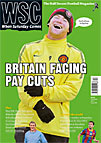 Producing a fanzine in 1986 was engaging in solidarity with a subculture. But, as Tom Davies argues, while the landscape has changed the issues remain the same
Producing a fanzine in 1986 was engaging in solidarity with a subculture. But, as Tom Davies argues, while the landscape has changed the issues remain the same
Hey, has anyone noticed that some footballers have funny haircuts? Aren’t there are a lot of ugly players in Liverpool’s team? And have you tasted the pies in some away ends? Anyone heard anyone behind them at the match say something particularly stupid or funny lately?

